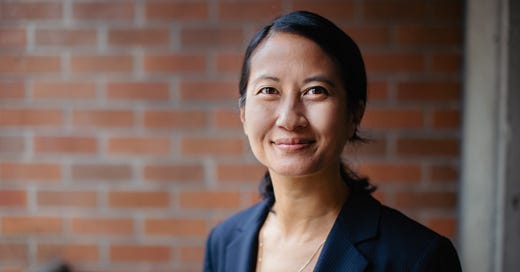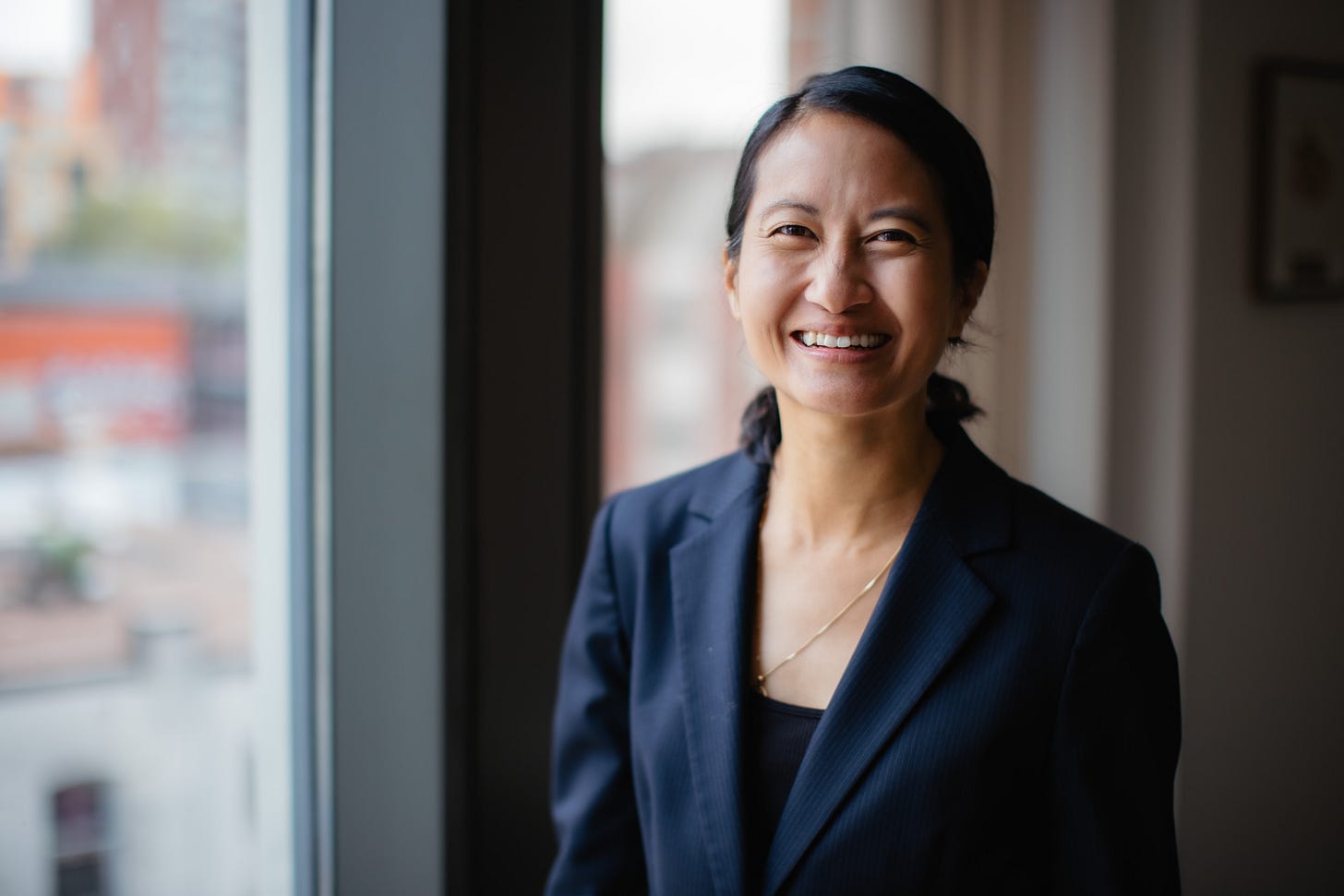Cassandra Hui is building the Netflix of clinical trials
We chat with the healthtech entrepreneur to learn more about how Heal Mary is empowering patients to better understand their diagnoses.
“Hail Mary” has so many meanings that it has reached the upper echelons of Wikipedia fame: the disambigulation. There’s the Catholic prayer, the last ditch football pass and even a Soviet era film that brings punctuation into the fray in Hail, Mary! Data security folks likely tell stories around campfires, their faces illuminated by a flashlight, of the Hail Mary Cloud, a password intercepting interface that still roams the mean streets of the World Wide Web. But, after chatting with Cassandra Hui, the only worthy connection in my brain (or browser) will actually be Heal Mary, the well-crafted name of her healthtech startup.
Heal Mary exists to empower healthcare patients to better understand their diagnoses. The company developed an application designed to connect patients, caregivers and doctors with clinical trials data from a global network of research. Armed with this powerful information, medical practitioners can lead their patients to the best possible health outcomes.
Hui’s journey is one of tragedy and then tech triumph. It stems from a distressing time for her family. In 2017, her mother and two sisters all received cancer diagnoses—an eerie exemplification of the old adage that all bad things come in threes. This time in Hui’s life was outlined by a Heal Mary pitch deck she shared with me. “After my mom’s Stage 4 cancer diagnosis and both of my sisters being diagnosed in 2017 with early stage cancer, I decided to shift my career from technology into digital health. I knew more could be done to help patients stay informed about their healthcare options. I believe that if you make it easy for a patient to understand a clinical trial and make it easy for a patient to enrol, you naturally alleviate the burden on an already stretched healthcare system,” read the slide devoted to the company’s “why.”
Heal Mary, then, is at the intersection of some of the most important things in life: health, family and impact. It was at this crossroads that her company was born.
“It wasn't really, ‘Okay, I'm gonna start a business right away.’ You go through a journey when it comes to health. You are looking for options and you’re making sure that you're going for everything. That’s something that I experienced as a caregiver or somebody on the outskirts. I've had to watch other people I love go through it. It just seemed like there's nothing out there. So, why not be the thing that’s out there?” Hui told me.
Hui took two years to reflect on her experience and what appeared to be a lack of accessibility of the information from clinical trials before she launched Heal Mary in 2019. It appears as though her experience reflected a problem within the industry. In that pitch deck, the company outlines this stark reality. 46% of clinical trials fail due to lack of enrollment. While 40% of cancer patients report they are happy to participate in a clinical trial, only 8% actually do. Even with these poor enrollment numbers, there are over 500,000 clinical trials happening worldwide. Imagine if your go-to music playlist was rounded up to 500,000 songs...and always on shuffle.
Hui and co. began work to remedy this. Drawing on those two years used to develop an understanding of cancer treatment made that a natural entry point. Her background in technology also made it a natural fit. Starting with cancer, the team began to amass information about clinical trials and clinical trialists. “I started to really sink my heels into figuring out where the gaps were. There's a lot of information and there's a lot of patients who are really keen to know a little more about their health care. If we have the skill in technology, why are we not finding the best ways to connect patients to that information?” she reflected.
A healhtech company launching in 2019 couldn’t have seen the profound change in our world—and how much society would rely upon their innovation—as the calendar turned over to 2020. Hui and her company pivoted at a breakneck pace.
“In April of 2020 we pivoted our business to help with COVID-19. We're here to help patients connect with trials, so why wouldn't we do that for all types of diseases? For us, there was nothing more serious and more pressing than COVID-19. Within 30 days, we built a COVID-19 specific platform,” Hui told me before getting into the specifics of how the pivot occurred. “The nitty gritty of what actually gets done, every time we launch, we use natural language processing to translate medical jargon to plain language. Our role is to make it easy for a patient to understand and enroll in trials. The second thing we did was we created an auto parsing so now you can see acceptance criteria for every single study that you're interested in,” Hui explained.
Hui and her team are hoping to move proactively and match their product development goals with their financial goals. “The next piece is to build out an auto-matching feature. So right now, I'll connect with each of the acceptance criteria. Well, what if you could fill it out once, and then an auto match comes through. It was really important for us this year to raise funds to do that.”
One avenue of financial success was the Campbell River Impact Investor Challenge, led by the city and Spring Activator, a Vancouver-based organization in place to support early stage ventures. Keith Ippel, CEO of the organization, recently highlighted the impact of impact investing to Vancouver Tech Journal. What’s so impactful? “The opportunity to support gender lens founders, women leaders and BIPOC leaders; really resetting on equality and equity,” he defined. During our conversation, Ippel also gave me the backstory of the Campbell River Impact Investor Challenge that awarded Heal Mary $50,000.
“It actually had started about two years pre-COVID but now with an incredible sense of urgency coming through COVID: the rise of small communities. Smaller communities, often 100,000 people or less, are really struggling to redefine themselves in the knowledge economy. What we have seen in the province of British Columbia, true story, Campbell River, BC is world renowned as being one of the most innovative small communities,” Ippel shared. “Rose Klukas, economic development officer, has spoken, for example, in London, UK, at a federation of economic development officers.” Not too shabby for a community of 37,000 people, close to half of the 67,173 spectators who packed London’s Wembley Stadium for the EURO 2020 Final last month.
“So they've created incredible momentum,” Ippel says of Campbell River. It was an inertia far too appealing to ignore. He sensed opportunity. “Can we do a place based investing program in a small community, knowing that Campbell River really is one of the best communities not only in BC, but also in the world to prove that? It included the participation of the local Angel group, the Campbell River Area Angel Group. It included the participation from local law firms, accounting firms and the city itself. We ended up having investors from across Canada, also. We had an investor joining from Toronto. We're like, ‘Hey, that’s fantastic but why the heck do you want to be involved with something in Campbell River?’ And they said, ‘Because we believe that the backbone of Canada is small towns. We want to be able to support that.’ There's a real power there,” he shared.
I chatted with Ippel before I chatted with Hui. Naturally, I couldn’t help but enquire about her version of the events. “Oh my gosh, my journey with Spring as an organization goes back to, I think, 2019. We were starting this idea, and the Vancouver Economic Commission was putting on an education program for founders in partnership with Spring. And that's the first time I met Keith Ippel. Last year, I participated in one of their investor challenges,” she recalled.
Heal Mary didn’t win but Hui was hooked. “I think what I loved about the investor challenge program, which is what led me to [the Campbell River Impact Investor Challenge] is, you get so much support and you actually get to spend time with your investors. If you're spending time with them, and they're getting to know you, I think that's the most value you'll ever get. It’s that data that we have from that experience that we've used to raise money with other investors, as well. For sure, I think this goes for many of the programs out there, you really need to maximize it. And it's about the types of people who are in there, the people who are actually supporting you and advocating for you. That’s beyond the investment. That's people removing barriers for you. That's massive.”
Powered by support from the tech community both spiritually and financially, Hui and Heal Mary will continue to define their tech and approach. “We've got an algorithm that we're building out to match against your acceptance criteria. Another thing I think that doesn't get looked at a lot, which is starting to get a lot of attention is prevention trials,” Hui pointed out. This drive is leading to a deeply impressive new feature.
“The next feature that we're trying to get to is almost a recommendation engine for your health. Like how Netflix, based on what you watch, will recommend movies for you. Based on how much acceptance criteria you fill out, we can start to match to better quality trials for you over time. And while this year was about COVID, we're still working in the cancer space. But we want to move into other diseases such as rare diseases, diabetes, and epilepsy.”
Hui sees her team as a great healthcare supplement, not a healthcare replacement. “I would like to add about the work that we're doing. It's really about engaging everybody within the clinical trial system. So it's not meant to replace the clinician, it's not to advise the patient outside of their current health team. It's really trying to bring a patient in as a collaborator in their health. We just want to help enable everybody who's on a care team.”
The response of local entrepreneurs—including Hui—to COVID has been incredible to witness. Her story made me think back to Peter Whitehead and Light AI’s use of their flu-discovering AI to create an instant COVID test earlier this year. Pair that with an anchor, life sciences company like Abcellera’s meteoric rise over the past year and I can’t help but feel we are in good hands with local healthtech, an important feeling—good hands are exactly what are needed to haul in a Hail Mary pass in the dying seconds of a football game.
For more profiles on local entrepreneurs, subscribe to our Sunday Briefing:








